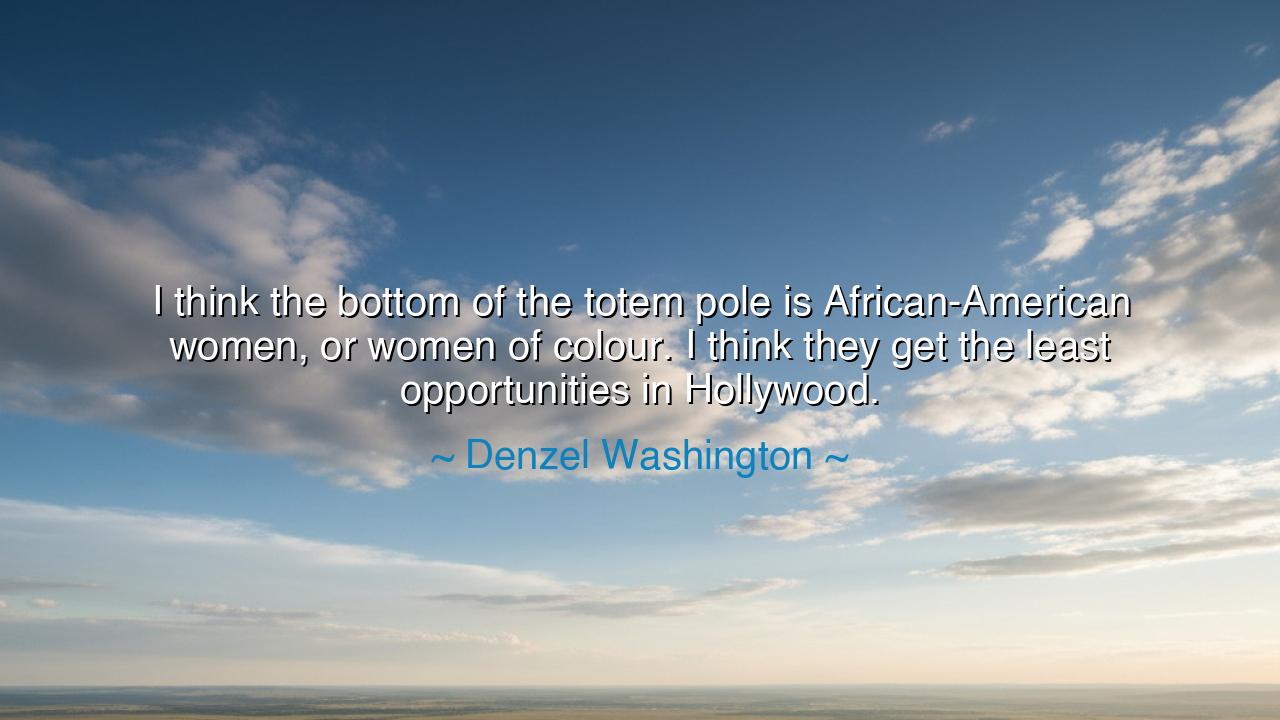
I think the bottom of the totem pole is African-American women
I think the bottom of the totem pole is African-American women, or women of colour. I think they get the least opportunities in Hollywood.






Denzel Washington, a titan of stage and screen, once spoke with solemn truth: “I think the bottom of the totem pole is African-American women, or women of colour. I think they get the least opportunities in Hollywood.” These words unveil the deep injustice that hides beneath the glitter of fame. For though the world sees Hollywood as a place of dreams, Washington reminds us that those dreams are not given equally. At the bottom of the totem pole stand women of color, whose talent is vast, yet whose chances are scarce, overshadowed by systems of exclusion.
The origin of these words lies in Washington’s long witness to the machinery of film. Having endured his own struggles against typecasting and limited roles, he understood that if it was difficult for a Black man to rise, it was doubly so for a Black woman. The hierarchy of opportunity placed them lowest, not for lack of brilliance, but because the gates of power were guarded by prejudice. His words are not an insult, but a defense—a call to see and to lift up those who have been pushed down.
History offers its testimony. Consider Hattie McDaniel, the first African-American to win an Academy Award for her role in Gone with the Wind. Though she achieved glory, she was confined to playing maids and servants, denied the full breadth of roles her talent deserved. Even as she stood on the stage of honor, she was forbidden from sitting with her white peers at the ceremony. This paradox reveals Washington’s truth: opportunities were rationed, and women of color bore the heaviest burden.
Yet from the depths of that totem pole, greatness still rose. Cicely Tyson, through sheer resolve, refused roles that demeaned her, choosing instead characters of dignity and strength. Though opportunities were few, she carved a path so that others might follow. Her life, like Washington’s words, proves that talent is never the issue—it is the doors that are shut, the gates that are locked, that hold back the flood of brilliance.
Therefore, O seekers of justice, heed this wisdom. The measure of a society, or of an industry, is not how it treats those at the top, but how it uplifts those at the bottom. Let Washington’s words be a beacon: African-American women and women of color do not lack worth; they lack opportunity. And when those opportunities are opened, when the totem pole is no longer a ladder of exclusion but a pillar of unity, then the brilliance of women long ignored will blaze forth like the rising sun. For buried talent is not destroyed—it waits, and when freed, it changes the world.






HVHien Vu
This quote sheds light on an important issue that often goes unspoken. African-American women and women of color frequently face systemic discrimination in Hollywood. I wonder, is the lack of opportunities tied to an ingrained cultural bias or the industry's reluctance to change? How can we push for more inclusive narratives, more representation, and ultimately, more opportunities for these women to succeed?
YNTran Yen Ni
Denzel Washington’s perspective highlights a harsh truth about the entertainment industry. It’s easy to see how African-American women and women of color face immense barriers, from fewer roles to a lack of recognition. Why does Hollywood, which has such a global influence, continue to perpetuate these inequalities? Could the industry be doing more to diversify not only the talent on screen but also the people making decisions behind the scenes?
PPhamduyquy
This is a tough but honest statement. It makes me think about the reality of diversity and inclusion in industries like Hollywood. While progress has been made, the fact that women of color are still at the bottom of the totem pole suggests that true equality has yet to be achieved. What steps can we take to challenge these systemic inequalities and ensure that all women, regardless of race, have equal access to opportunities?
TTVu Pham Thanh Thao
Denzel Washington’s quote brings to light the ongoing challenges faced by African-American women and women of color in Hollywood. It's unsettling to think that such talent is so often overlooked or marginalized. Are there systemic barriers in place that limit opportunities for these women, or is it simply a matter of cultural bias? How can Hollywood, and society in general, address these inequities and create more opportunities for underrepresented groups?